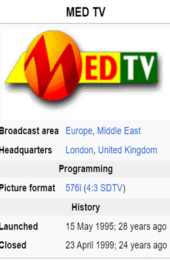Zarok TV
Zarok TV (English: Kid TV[1]) is the first Kurdish satellite television station in Turkey for Kurdish children, broadcasting since 21 March 2015, based in Diyarbakır (Amed). The channel broadcasts programs in various Kurdish languages, specifically Kurmanji, being the most widely spoken Kurdish dialect in Turkey, Zazaki and some Sorani.[2][3]
Accused of “separatist and subversive” activities, it was shut down on 29 September 2016 under the emergency statutory decree issued during the aftermath of 15 July's failed coup d'état, alongside 12 other television and 11 radio stations, when the police raided the television station's headquarters.[4][5][6][7][8] Zarok TV's director, said there were no warning before the closure.[9]
In November 2016 the TV station was allowed to broadcast again after much criticism for the sudden closure. The European Parliament condemned the Turkish authorities stating “misusing” law in the aftermath of the unsuccessful coup attempt. Owner of Zarok TV and also several other cultural Kurdish TV channels, estimated the company had lost “125-150 thousand dollars” in October due to closures.[10]
Rûdaw
Rudaw Media Network (Kurdish: تۆڕی میدیاییی ڕووداو, romanized: Tora Medyayî ya Rûdaw), is a major media broadcaster in the Kurdistan Region, Iraq.[2][3][4]
Rudaw Media Network, headquartered in Erbil, the capital of Iraq's Kurdistan Region, operates as a global media powerhouse with correspondents strategically positioned across the Middle East, Europe, and the United States.
This multi-faceted media outlet delivers content in various languages, including English, Kurdish, Arabic, and Turkish.[5]
History
Rudaw Media Network originated as a weekly print newspaper distributed in the Kurdistan Region and Europe, the network initially garnered international attention through its European edition, catering to the burgeoning diaspora communities of that era. In a noteworthy commitment to environmental sustainability, Rudaw transitioned from print to a fully digital format, discontinuing its newspaper publication.
The network's diverse portfolio includes a weekly newspaper in the Sorani dialect, boasting a circulation of 3,000, a Kurmanji version circulated in Europe, a comprehensive website available in Kurdish, English, Arabic, and Turkish, and a satellite TV station. Rudaw Media Network is funded and supported by Rudaw Company, with a primary mission to disseminate news and information concerning Kurdistan and the broader Middle East region.
In the present day, Rudaw Media Network has expanded its reach to include a radio news channel broadcasting on shortwave throughout the Middle East. Furthermore, its live stream is accessible to global audiences online. Notably, in 2023, the network introduced its podcast portal, featuring a diverse array of podcasts spanning topics such as culture, news, politics, economics, and technology.
MED TV
MED TV was the first Kurdish satellite TV[1] with studios in London, England and Denderleeuw, Belgium. MED TV broadcast programs mainly in six languages, Kurdish (Sorani, Kurmanji, and Zaza dialects), English, Arabic, Assyrian and Turkish.
Programs and audience
MED TV Programmes were a varied mix from children's programs, music, documentaries and news broadcasts.[2] A program in which Kurdish books written in the three scripts of Arabic, Kyrillic and Latin were discussed, was moderated by a journalist of Özgür Gündem.[2] It broadcast to Europe, North Africa and the Middle East. Its primary audience was in the Middle East where it was seen by many as a refreshing source of information outside of state censorship. It also has a large audience amongst the Kurdish population scattered throughout Europe.[citation needed] In Turkey, it was forbidden to watch Med TV, people were arrested for having been caught watching its programs. The police would search for satellite dishs in Diyarbakır, which they'd confiscate.[2] Turkey saw MED TV as a part of the Kurdistan Workers' Party (PKK),[3] which it classifies as a terrorist organization. Nonetheless its shows were very popular amongst Kurds in Turkey.[4]
Organization
At its establishment in 1995, thirteen media workers employed at the Television. Most were amateurs, only one had an education in the field. The company expanded its activities significantly until in 1997, the television counted with 250 employees.[2] The TV had close ties with the newspaper Özgür Gündem, whose chief-editor Gurbetelli Ersöz was also MED TVs chief-editor for Turkish Kurdistan.[2]


